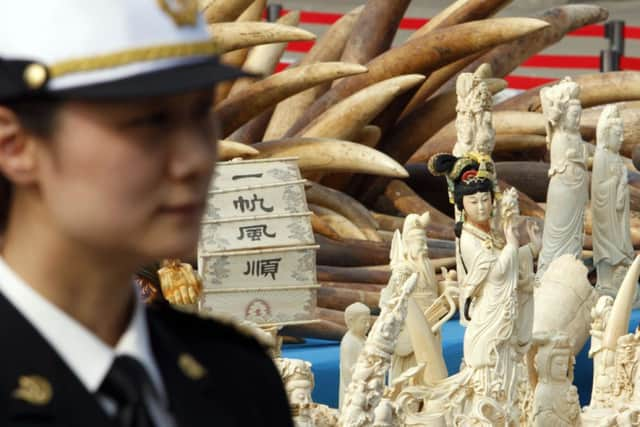China takes stand to save elephant


Animal rights groups say China’s growing appetite for the contraband material has fuelled a surge in poaching in Africa, and led to the deaths of tens of thousands of elephants.
Yesterday’s event was attended by representatives of the Convention on International Trade in Endangered Species (Cites).
Advertisement
Hide AdAdvertisement
Hide AdIts secretary general, John Scanlon, said: “China is sending a very powerful message both domestically, to the Chinese people, and internationally, that it is not prepared to tolerate the illegal trade in elephant ivory.”
The function, on the outskirts of the industrial city of Dongguan in southern Guangdong province, where much of China’s ivory trade is focused, featured elephant tusks placed in the shape of a flower on an outdoor stage, surrounded by ivory statues of the Buddha.
But China, ranked as the world’s biggest end-market for poached ivory by the WWF conservation body, still has work to do, officials said.
Yang Liuying, an anti-smuggling researcher for the Chinese customs department, said: “There is an increasing trend of ivory being smuggled to China. We have to strengthen our efforts in this area. There is a 10 per cent increase every year.”
Fan Zhiyong, head of WWF-China’s species programme, said: “WWF believes that destroying seized ivory is a signal of the government’s commitment to enhance law enforcement against illegal ivory trade that will support international action against elephant poaching and illegal wildlife trade.
“Tens of thousands of African elephants are being killed by poachers because of the high demand for ivory. China’s gesture is a solemn commitment by the government to cleanse the Chinese ivory market and to guarantee the survival of Africa’s elephants.”
Conservation group Save the Elephants said demand for ivory had grown along with China’s population and economy.
Products have been made from elephant ivory in China for almost 5,000 years, according to the country’s Endangered Species Import and Export Management Office. Crushed tusks also play a small role in traditional Chinese medicine.
Advertisement
Hide AdAdvertisement
Hide AdAlthough China signed the Cites pact banning global trade in ivory in 1981, it got an exemption in 2008 to buy 62 tonnes of ivory from several African nations. It releases a portion of that stockpile each year to government-licensed ivory-carving factories. China says the factories use only ivory acquired legally, and in no way encourage or worsen the problem of elephant poaching in Africa.
Last spring, China was one of eight Asian and African states identified by Cites as a primary source, transit or import country for illegal ivory, and was asked to submit a plan outlining how it would better address regulation and enforcement.
Although Beijing has said it will jail convicted ivory smugglers for life, it has stopped short of saying it will ban the trade outright.
About 22,000 elephants were illegally killed in 2012, Cites monitoring showed. The total population of African elephants is now estimated at between 420,000 and 650,000.
Hong Kong, a major transit point for illegal ivory, is due to discuss disposal plans for its stockpile of 32.6 tonnes of seized ivory later this month.